人教新目标九年级英语Unit 3 Could you please tell me where the restrooms are?教学设计 (7课时)
文档属性
| 名称 | 人教新目标九年级英语Unit 3 Could you please tell me where the restrooms are?教学设计 (7课时) |
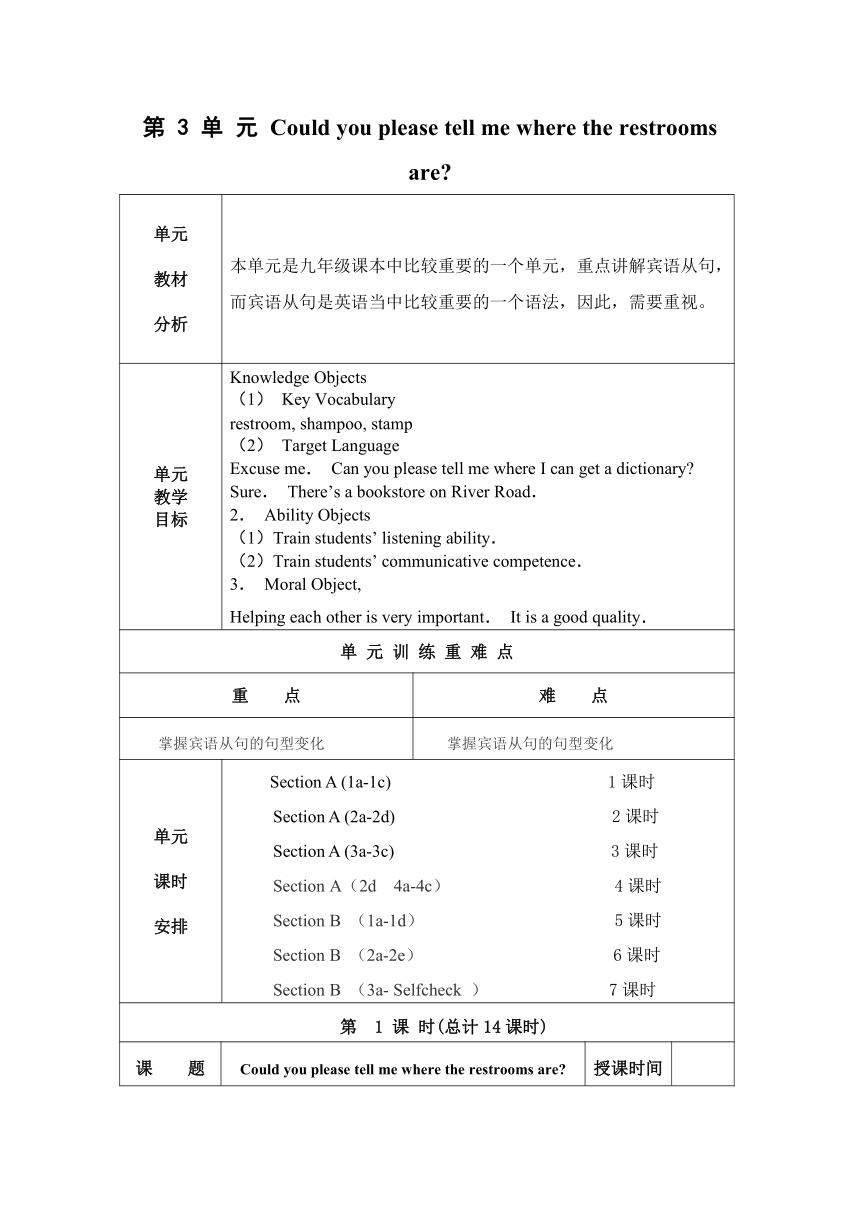
|
|
| 格式 | zip | ||
| 文件大小 | 110.5KB | ||
| 资源类型 | 教案 | ||
| 版本资源 | 人教新目标(Go for it)版 | ||
| 科目 | 英语 | ||
| 更新时间 | 2021-10-31 00:00:00 | ||
图片预览

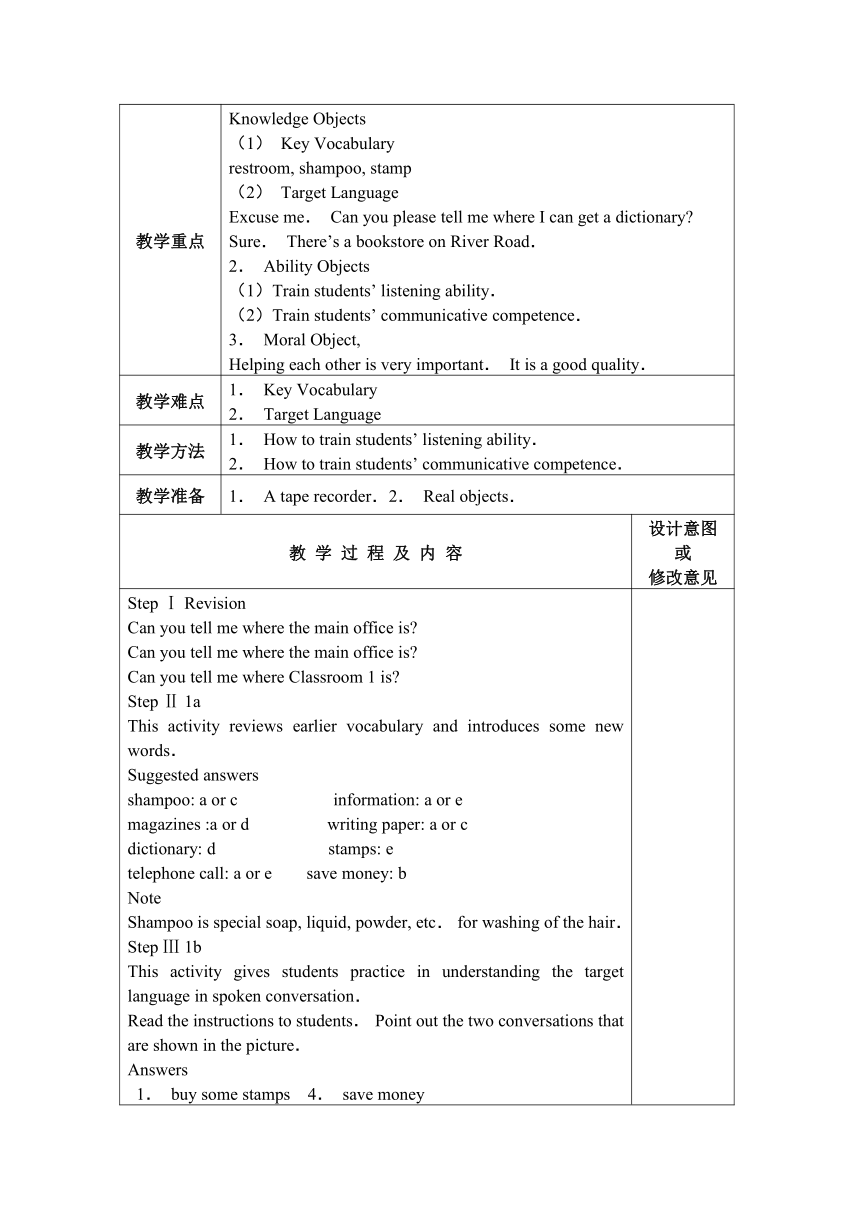
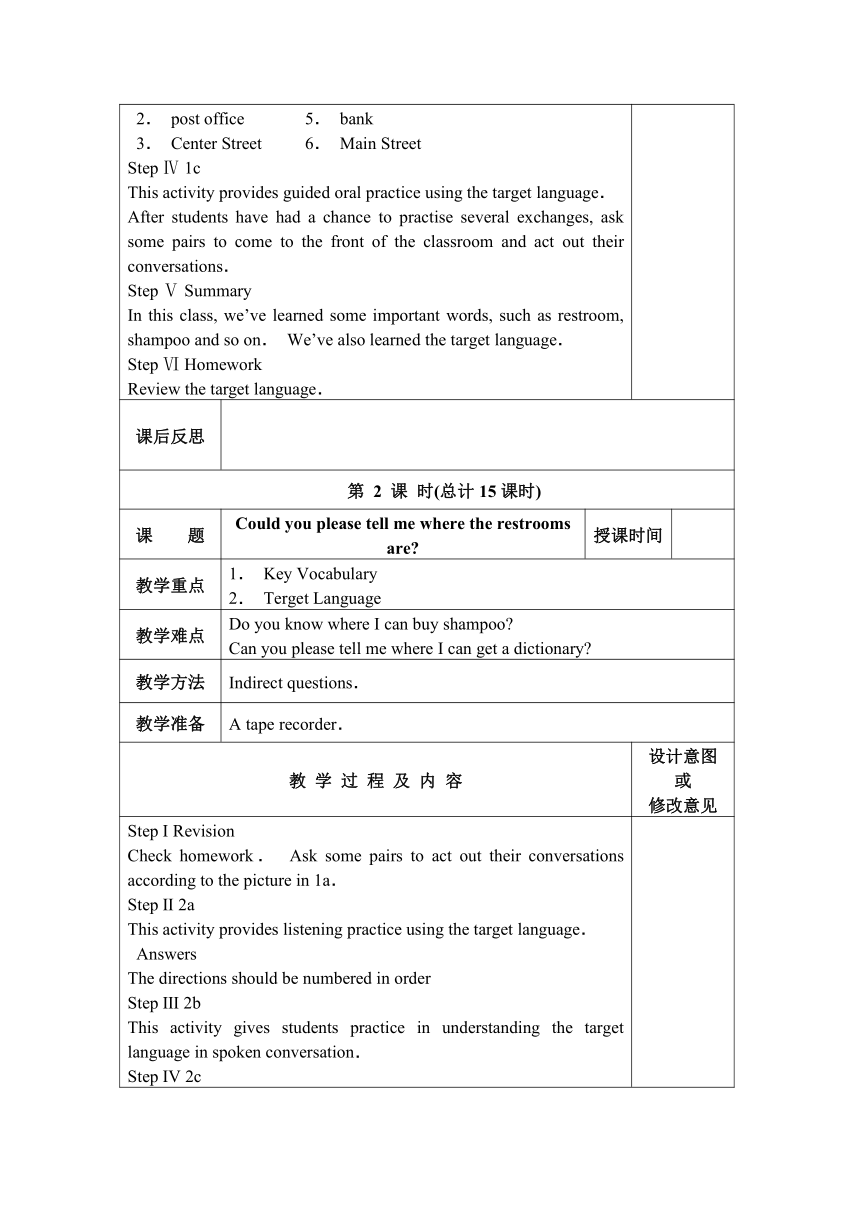
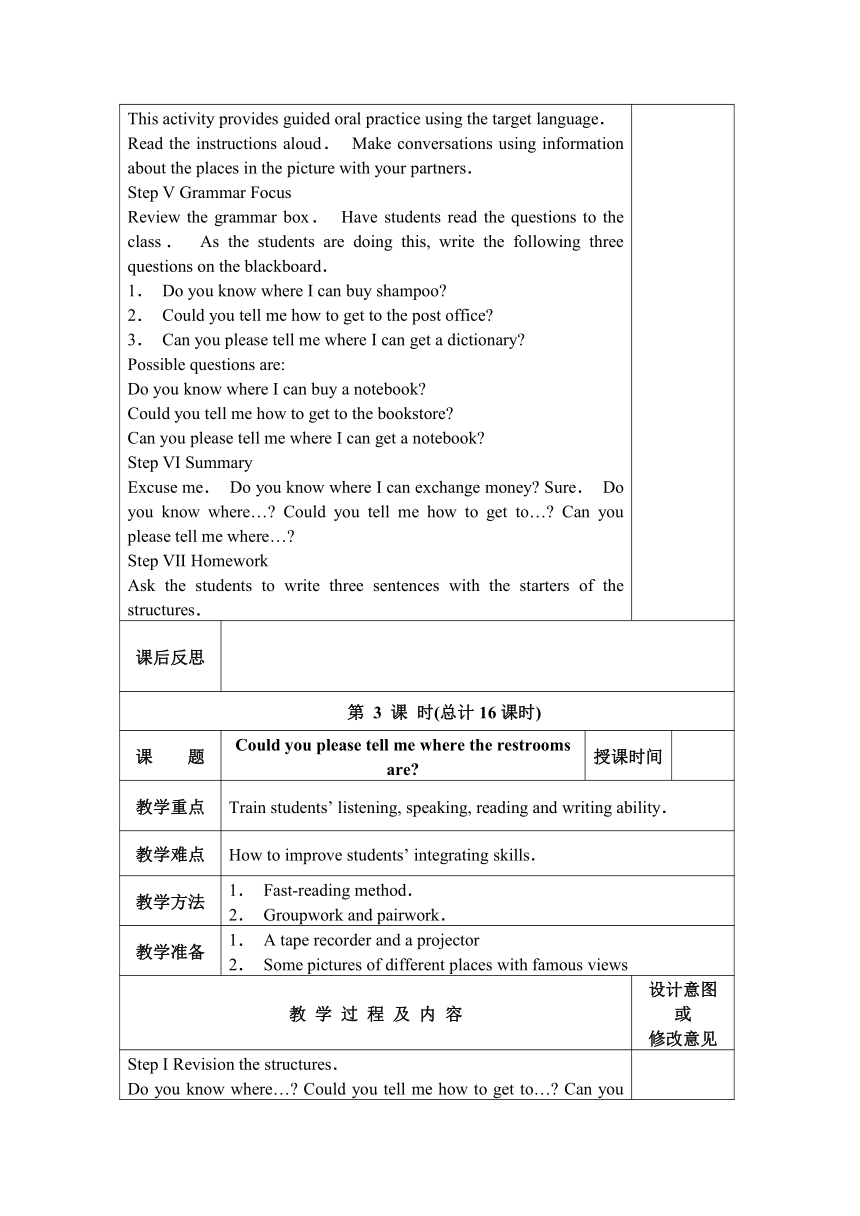
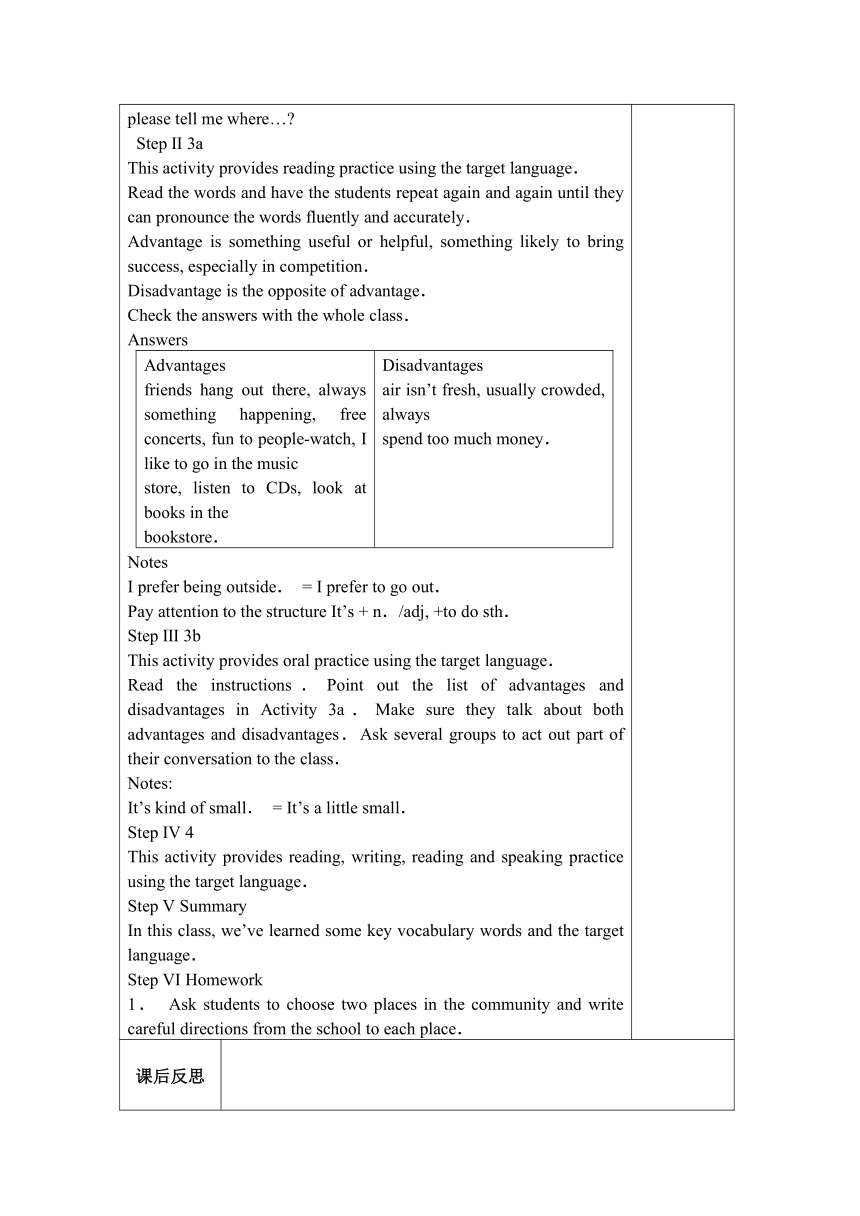
文档简介
第 3 单 元 Could you please tell me where the restrooms are
单元教材分析 本单元是九年级课本中比较重要的一个单元,重点讲解宾语从句,而宾语从句是英语当中比较重要的一个语法,因此,需要重视。
单元教学目标 Knowledge Objects(1) Key Vocabularyrestroom, shampoo, stamp(2) Target LanguageExcuse me. Can you please tell me where I can get a dictionary Sure. There’s a bookstore on River Road.2. Ability Objects(1)Train students’ listening ability.(2)Train students’ communicative competence.3. Moral Object,Helping each other is very important. It is a good quality.
单 元 训 练 重 难 点
重 点 难 点
掌握宾语从句的句型变化 掌握宾语从句的句型变化
单元课时安排 Section A (1a-1c) 1课时 Section A (2a-2d) 2课时 Section A (3a-3c) 3课时 Section A(2d 4a-4c) 4课时 Section B (1a-1d) 5课时 Section B (2a-2e) 6课时 Section B (3a- Selfcheck ) 7课时
第 1 课 时(总计14课时)
课 题 Could you please tell me where the restrooms are 授课时间
教学重点 Knowledge Objects(1) Key Vocabularyrestroom, shampoo, stamp(2) Target LanguageExcuse me. Can you please tell me where I can get a dictionary Sure. There’s a bookstore on River Road.2. Ability Objects(1)Train students’ listening ability.(2)Train students’ communicative competence.3. Moral Object,Helping each other is very important. It is a good quality.
教学难点 1. Key Vocabulary2. Target Language
教学方法 1. How to train students’ listening ability.2. How to train students’ communicative competence.
教学准备 1. A tape recorder.2. Real objects.
教 学 过 程 及 内 容 设计意图或修改意见
Step Ⅰ RevisionCan you tell me where the main office is Can you tell me where the main office is Can you tell me where Classroom 1 is Step Ⅱ 1aThis activity reviews earlier vocabulary and introduces some new words.Suggested answersshampoo: a or c information: a or emagazines :a or d writing paper: a or cdictionary: d stamps: etelephone call: a or e save money: bNoteShampoo is special soap, liquid, powder, etc. for washing of the hair.Step Ⅲ 1bThis activity gives students practice in understanding the target language in spoken conversation.Read the instructions to students. Point out the two conversations that are shown in the picture.Answers 1. buy some stamps 4. save money 2. post office 5. bank 3. Center Street 6. Main StreetStep Ⅳ 1cThis activity provides guided oral practice using the target language.After students have had a chance to practise several exchanges, ask some pairs to come to the front of the classroom and act out their conversations.Step Ⅴ SummaryIn this class, we’ve learned some important words, such as restroom, shampoo and so on. We’ve also learned the target language.Step Ⅵ HomeworkReview the target language.
课后反思
第 2 课 时(总计15课时)
课 题 Could you please tell me where the restrooms are 授课时间
教学重点 1. Key Vocabulary2. Terget Language
教学难点 Do you know where I can buy shampoo Can you please tell me where I can get a dictionary
教学方法 Indirect questions.
教学准备 A tape recorder.
教 学 过 程 及 内 容 设计意图或修改意见
Step Ⅰ RevisionCheck homework. Ask some pairs to act out their conversations according to the picture in 1a.Step Ⅱ 2aThis activity provides listening practice using the target language. AnswersThe directions should be numbered in orderStep Ⅲ 2bThis activity gives students practice in understanding the target language in spoken conversation.Step Ⅳ 2cThis activity provides guided oral practice using the target language.Read the instructions aloud. Make conversations using information about the places in the picture with your partners.Step Ⅴ Grammar FocusReview the grammar box. Have students read the questions to the class. As the students are doing this, write the following three questions on the blackboard.1. Do you know where I can buy shampoo 2. Could you tell me how to get to the post office 3. Can you please tell me where I can get a dictionary Possible questions are:Do you know where I can buy a notebook Could you tell me how to get to the bookstore Can you please tell me where I can get a notebook Step Ⅵ SummaryExcuse me. Do you know where I can exchange money Sure. Do you know where… Could you tell me how to get to… Can you please tell me where… Step Ⅶ HomeworkAsk the students to write three sentences with the starters of the structures.
课后反思
第 3 课 时(总计16课时)
课 题 Could you please tell me where the restrooms are 授课时间
教学重点 Train students’ listening, speaking, reading and writing ability.
教学难点 How to improve students’ integrating skills.
教学方法 1. Fast-reading method.2. Groupwork and pairwork.
教学准备 1. A tape recorder and a projector2. Some pictures of different places with famous views
教 学 过 程 及 内 容 设计意图或修改意见
Step Ⅰ Revision the structures.Do you know where… Could you tell me how to get to… Can you please tell me where… Step Ⅱ 3aThis activity provides reading practice using the target language.Read the words and have the students repeat again and again until they can pronounce the words fluently and accurately.Advantage is something useful or helpful, something likely to bring success, especially in competition.Disadvantage is the opposite of advantage. Check the answers with the whole class.AnswersAdvantagesfriends hang out there, always something happening, free concerts, fun to people-watch, I like to go in the musicstore, listen to CDs, look at books in thebookstore.Disadvantagesair isn’t fresh, usually crowded, alwaysspend too much money.NotesI prefer being outside. = I prefer to go out.Pay attention to the structure It’s + n./adj, +to do sth.Step Ⅲ 3bThis activity provides oral practice using the target language.Read the instructions.Point out the list of advantages and disadvantages in Activity 3a.Make sure they talk about both advantages and disadvantages.Ask several groups to act out part of their conversation to the class.Notes:It’s kind of small. = It’s a little small.Step Ⅳ 4This activity provides reading, writing, reading and speaking practice using the target language.Step Ⅴ SummaryIn this class, we’ve learned some key vocabulary words and the target language.Step Ⅵ Homework1. Ask students to choose two places in the community and write careful directions from the school to each place.
课后反思
第 4 课 时(总计17课时)
课 题 Could you please tell me where the restrooms are 授课时间
教学重点 1. Key Vocabulary2. Target Language
教学难点 1. How to improve students’ writing and speaking ability.2. How to use the target language.
教学方法 1. Pair work to make every student work in class.2. Listening method.
教学准备 1. A tape recorder and a projector2. Some pictures of different places with famous views
教 学 过 程 及 内 容 设计意图或修改意见
Step Ⅰ Revision Check homework.Step Ⅱ 1aThis activity provides reading and writing practice using the target language.Go through the instructions.Read and understand. Point out that students can also write other words after the word clean.Ask students to write words from the box in the blanks on their own. Sample answersNotesinexpensive--not expensive; low--priced2. fascinating--having strong charm or attractionStep Ⅲ 1bThis activity provides guided oral practice using the target language.Read the instructions to the class.work with a partner.Invite several pairs of students to say their conversations to the class.Step Ⅳ 2aThis activity provides listening practice using the target language.Step Ⅴ 2bThis activity provides guided listening practice using the target language. Check the answers.Step Ⅵ 2cAsk one or two pairs to say their conversations to the class.Step Ⅶ Summary and homeworkIn this class, we’ve learned some key vocabulary, such as safe, convenient and so on. We’ve also learned the target language
课后反思
第 5 课 时(总计18课时)
课 题 Could you please tell me where the restrooms are 授课时间
教学重点 Practise reading and writing using the target language.
教学难点 How to write a guide to a place.
教学方法 1.Reading comprehension to help the students grasp the main idea of the text.2.Pairwork or group work to make every students work in class.
教学准备 A tape recorder
教 学 过 程 及 内 容 设计意图或修改意见
Step Ⅰ RevisionReview the target language presented in this unit. Check homework.Step Ⅱ 3aThis activity provides reading and writing practice using the target language.Teach the new words.Invite a student to read the article aloud to the class. Correct any pronunciation errors to make sure the student is providing a good model for the rest of the class.Ask students to read the article again and complete the chart in pairs.Step Ⅲ 3bThis activity provides reading and writing practice using the target language.Ask the students to complete the brochure on their own.Step Ⅳ 3cThis activity provides open-ended writing practice using the target language.Step Ⅴ Part 4This activity provides guided oral practice using the target language.Go through the instructions with the class.Ask one or two groups to say one of their conversations to the class.Step Ⅵ SummaryIn this class, we’ve done much practice reading and writing as well as speaking.Step Ⅶ Homework1. Read the article in 3a again.2. Write a guide to our city.
课后反思
第 6 课 时(总计19课时)
课 题 Could you please tell me where the restrooms are 授课时间
教学重点 1. Fill in blanks and make sentences.2. Write questions using the target language.
教学难点 Make sentences using "beautiful, safe, delicious, convenient, fascinating".
教学方法 1. Teaching by explanation.2. Speaking method.
教学准备 A tape recorder
教 学 过 程 及 内 容 设计意图或修改意见
Step Ⅰ RevisionCheck homework. Ask a few students to read the article in 3a.Step Ⅱ Part 1This activity focuses on vocabulary introduced in the unit.Ask to read. Make sure to understand the meaning of the words. Ask students to fill in the blanks on their own.Check the answers.Ask students to make their own sentences with the words, Then help students correct the mistakes.Step ⅢPart 2This activity provides reading, writing, listening and speaking practice using the target language.Go through the instructions with the class.Get students to complete the work in pairs.Check the answers .Suggested answers 1. Excuse me, could you tell me where the bank is, please 2. Could you please tell me if there are any restaurants here 3. Do you know where I can get a book 4. Can you please tell me how to get to the Movie Theatre 5. Could you tell me where I can buy shampoo Step Ⅳ Just for Fun!This activity provides reading and speaking with the target language.Step Ⅴ Summary and Homework
课后反思
第 7 课 时(总计20课时)
课 题 Could you please tell me where the restrooms are 授课时间
教学重点 Improve Fast-reading, Careful-reading to get the detailed information in the text.
教学难点 Train students’ reading and writing skills.
教学方法 Pair work and group work to make every student work in class.
教学准备 A tape recorder and a projector
教 学 过 程 及 内 容 设计意图或修改意见
Step I Before you read Key VocabularyThis activity introduces the key words, then Finish off 1a and 1bStep Ⅱ While you readRead the text quickly, then summarize each paragraph in your own words.Listen to the recording and read for the general idea of the passage, This time encourages students to read quickly for detail. underline all the expressions and circle all the connectives.Asking for information or help is a very common and necessary activity, especially when we visit a foreign country, so knowing how to ask for information politely is important. In English, “Where are the restrooms ” and “Could you please tell me where the restrooms are ” are similar requests — both are correct English, but the first could sound rude. It’s important to use correct language, but sometimes this alone is not enough— we need to learn how to be polite when we make requests.In English, just like in Chinese, we change the way we speak when talking with different people. The expressions you use might depend on whom you are speaking to or how well you know them. If you said to your teacher, “Where is my book ”, this might sound rude. But if you said, “Excuse me, Mr. West. Do you know where my book is ”, your question will sound much more polite. On the other hand, it might be all right to say “Where is my book ” in some situations, perhaps with people you know well. And you would not usually say, “Peter, lend me your pen.” A very direct order like this can sound rude in English. Usually in English polite questions are longer and include extra language such as ‘Could you please… ’ or ‘Can I ask… ’ It sounds more polite to say, “Peter, could you please lend me your pen ” Sometimes, we might even need to spend some time leading in to a question or request. For example, if you stop a stranger in the street, we might first say, “Excuse me, I wonder if you can help me” or “I’m sorry to trouble you but,” before asking them for help.It might seem that speaking politely is more difficult than being direct, and in a way this may be true. However, in order not to offend people, learning about language etiquette is just as learning grammar or vocabulary. And doing this will also help you become better at English, or any other language you wish to speak. step Ⅲ After you read As the students are doing this, move around the classroom to make sure they can do the task in English.Finish the other task in groups.Ask students to report their answersStep ⅣSummaryIn this class, we’ve learned some key sentences and some other words. We have also learned the target language. StepⅤ Homework
课后反思
单元教材分析 本单元是九年级课本中比较重要的一个单元,重点讲解宾语从句,而宾语从句是英语当中比较重要的一个语法,因此,需要重视。
单元教学目标 Knowledge Objects(1) Key Vocabularyrestroom, shampoo, stamp(2) Target LanguageExcuse me. Can you please tell me where I can get a dictionary Sure. There’s a bookstore on River Road.2. Ability Objects(1)Train students’ listening ability.(2)Train students’ communicative competence.3. Moral Object,Helping each other is very important. It is a good quality.
单 元 训 练 重 难 点
重 点 难 点
掌握宾语从句的句型变化 掌握宾语从句的句型变化
单元课时安排 Section A (1a-1c) 1课时 Section A (2a-2d) 2课时 Section A (3a-3c) 3课时 Section A(2d 4a-4c) 4课时 Section B (1a-1d) 5课时 Section B (2a-2e) 6课时 Section B (3a- Selfcheck ) 7课时
第 1 课 时(总计14课时)
课 题 Could you please tell me where the restrooms are 授课时间
教学重点 Knowledge Objects(1) Key Vocabularyrestroom, shampoo, stamp(2) Target LanguageExcuse me. Can you please tell me where I can get a dictionary Sure. There’s a bookstore on River Road.2. Ability Objects(1)Train students’ listening ability.(2)Train students’ communicative competence.3. Moral Object,Helping each other is very important. It is a good quality.
教学难点 1. Key Vocabulary2. Target Language
教学方法 1. How to train students’ listening ability.2. How to train students’ communicative competence.
教学准备 1. A tape recorder.2. Real objects.
教 学 过 程 及 内 容 设计意图或修改意见
Step Ⅰ RevisionCan you tell me where the main office is Can you tell me where the main office is Can you tell me where Classroom 1 is Step Ⅱ 1aThis activity reviews earlier vocabulary and introduces some new words.Suggested answersshampoo: a or c information: a or emagazines :a or d writing paper: a or cdictionary: d stamps: etelephone call: a or e save money: bNoteShampoo is special soap, liquid, powder, etc. for washing of the hair.Step Ⅲ 1bThis activity gives students practice in understanding the target language in spoken conversation.Read the instructions to students. Point out the two conversations that are shown in the picture.Answers 1. buy some stamps 4. save money 2. post office 5. bank 3. Center Street 6. Main StreetStep Ⅳ 1cThis activity provides guided oral practice using the target language.After students have had a chance to practise several exchanges, ask some pairs to come to the front of the classroom and act out their conversations.Step Ⅴ SummaryIn this class, we’ve learned some important words, such as restroom, shampoo and so on. We’ve also learned the target language.Step Ⅵ HomeworkReview the target language.
课后反思
第 2 课 时(总计15课时)
课 题 Could you please tell me where the restrooms are 授课时间
教学重点 1. Key Vocabulary2. Terget Language
教学难点 Do you know where I can buy shampoo Can you please tell me where I can get a dictionary
教学方法 Indirect questions.
教学准备 A tape recorder.
教 学 过 程 及 内 容 设计意图或修改意见
Step Ⅰ RevisionCheck homework. Ask some pairs to act out their conversations according to the picture in 1a.Step Ⅱ 2aThis activity provides listening practice using the target language. AnswersThe directions should be numbered in orderStep Ⅲ 2bThis activity gives students practice in understanding the target language in spoken conversation.Step Ⅳ 2cThis activity provides guided oral practice using the target language.Read the instructions aloud. Make conversations using information about the places in the picture with your partners.Step Ⅴ Grammar FocusReview the grammar box. Have students read the questions to the class. As the students are doing this, write the following three questions on the blackboard.1. Do you know where I can buy shampoo 2. Could you tell me how to get to the post office 3. Can you please tell me where I can get a dictionary Possible questions are:Do you know where I can buy a notebook Could you tell me how to get to the bookstore Can you please tell me where I can get a notebook Step Ⅵ SummaryExcuse me. Do you know where I can exchange money Sure. Do you know where… Could you tell me how to get to… Can you please tell me where… Step Ⅶ HomeworkAsk the students to write three sentences with the starters of the structures.
课后反思
第 3 课 时(总计16课时)
课 题 Could you please tell me where the restrooms are 授课时间
教学重点 Train students’ listening, speaking, reading and writing ability.
教学难点 How to improve students’ integrating skills.
教学方法 1. Fast-reading method.2. Groupwork and pairwork.
教学准备 1. A tape recorder and a projector2. Some pictures of different places with famous views
教 学 过 程 及 内 容 设计意图或修改意见
Step Ⅰ Revision the structures.Do you know where… Could you tell me how to get to… Can you please tell me where… Step Ⅱ 3aThis activity provides reading practice using the target language.Read the words and have the students repeat again and again until they can pronounce the words fluently and accurately.Advantage is something useful or helpful, something likely to bring success, especially in competition.Disadvantage is the opposite of advantage. Check the answers with the whole class.AnswersAdvantagesfriends hang out there, always something happening, free concerts, fun to people-watch, I like to go in the musicstore, listen to CDs, look at books in thebookstore.Disadvantagesair isn’t fresh, usually crowded, alwaysspend too much money.NotesI prefer being outside. = I prefer to go out.Pay attention to the structure It’s + n./adj, +to do sth.Step Ⅲ 3bThis activity provides oral practice using the target language.Read the instructions.Point out the list of advantages and disadvantages in Activity 3a.Make sure they talk about both advantages and disadvantages.Ask several groups to act out part of their conversation to the class.Notes:It’s kind of small. = It’s a little small.Step Ⅳ 4This activity provides reading, writing, reading and speaking practice using the target language.Step Ⅴ SummaryIn this class, we’ve learned some key vocabulary words and the target language.Step Ⅵ Homework1. Ask students to choose two places in the community and write careful directions from the school to each place.
课后反思
第 4 课 时(总计17课时)
课 题 Could you please tell me where the restrooms are 授课时间
教学重点 1. Key Vocabulary2. Target Language
教学难点 1. How to improve students’ writing and speaking ability.2. How to use the target language.
教学方法 1. Pair work to make every student work in class.2. Listening method.
教学准备 1. A tape recorder and a projector2. Some pictures of different places with famous views
教 学 过 程 及 内 容 设计意图或修改意见
Step Ⅰ Revision Check homework.Step Ⅱ 1aThis activity provides reading and writing practice using the target language.Go through the instructions.Read and understand. Point out that students can also write other words after the word clean.Ask students to write words from the box in the blanks on their own. Sample answersNotesinexpensive--not expensive; low--priced2. fascinating--having strong charm or attractionStep Ⅲ 1bThis activity provides guided oral practice using the target language.Read the instructions to the class.work with a partner.Invite several pairs of students to say their conversations to the class.Step Ⅳ 2aThis activity provides listening practice using the target language.Step Ⅴ 2bThis activity provides guided listening practice using the target language. Check the answers.Step Ⅵ 2cAsk one or two pairs to say their conversations to the class.Step Ⅶ Summary and homeworkIn this class, we’ve learned some key vocabulary, such as safe, convenient and so on. We’ve also learned the target language
课后反思
第 5 课 时(总计18课时)
课 题 Could you please tell me where the restrooms are 授课时间
教学重点 Practise reading and writing using the target language.
教学难点 How to write a guide to a place.
教学方法 1.Reading comprehension to help the students grasp the main idea of the text.2.Pairwork or group work to make every students work in class.
教学准备 A tape recorder
教 学 过 程 及 内 容 设计意图或修改意见
Step Ⅰ RevisionReview the target language presented in this unit. Check homework.Step Ⅱ 3aThis activity provides reading and writing practice using the target language.Teach the new words.Invite a student to read the article aloud to the class. Correct any pronunciation errors to make sure the student is providing a good model for the rest of the class.Ask students to read the article again and complete the chart in pairs.Step Ⅲ 3bThis activity provides reading and writing practice using the target language.Ask the students to complete the brochure on their own.Step Ⅳ 3cThis activity provides open-ended writing practice using the target language.Step Ⅴ Part 4This activity provides guided oral practice using the target language.Go through the instructions with the class.Ask one or two groups to say one of their conversations to the class.Step Ⅵ SummaryIn this class, we’ve done much practice reading and writing as well as speaking.Step Ⅶ Homework1. Read the article in 3a again.2. Write a guide to our city.
课后反思
第 6 课 时(总计19课时)
课 题 Could you please tell me where the restrooms are 授课时间
教学重点 1. Fill in blanks and make sentences.2. Write questions using the target language.
教学难点 Make sentences using "beautiful, safe, delicious, convenient, fascinating".
教学方法 1. Teaching by explanation.2. Speaking method.
教学准备 A tape recorder
教 学 过 程 及 内 容 设计意图或修改意见
Step Ⅰ RevisionCheck homework. Ask a few students to read the article in 3a.Step Ⅱ Part 1This activity focuses on vocabulary introduced in the unit.Ask to read. Make sure to understand the meaning of the words. Ask students to fill in the blanks on their own.Check the answers.Ask students to make their own sentences with the words, Then help students correct the mistakes.Step ⅢPart 2This activity provides reading, writing, listening and speaking practice using the target language.Go through the instructions with the class.Get students to complete the work in pairs.Check the answers .Suggested answers 1. Excuse me, could you tell me where the bank is, please 2. Could you please tell me if there are any restaurants here 3. Do you know where I can get a book 4. Can you please tell me how to get to the Movie Theatre 5. Could you tell me where I can buy shampoo Step Ⅳ Just for Fun!This activity provides reading and speaking with the target language.Step Ⅴ Summary and Homework
课后反思
第 7 课 时(总计20课时)
课 题 Could you please tell me where the restrooms are 授课时间
教学重点 Improve Fast-reading, Careful-reading to get the detailed information in the text.
教学难点 Train students’ reading and writing skills.
教学方法 Pair work and group work to make every student work in class.
教学准备 A tape recorder and a projector
教 学 过 程 及 内 容 设计意图或修改意见
Step I Before you read Key VocabularyThis activity introduces the key words, then Finish off 1a and 1bStep Ⅱ While you readRead the text quickly, then summarize each paragraph in your own words.Listen to the recording and read for the general idea of the passage, This time encourages students to read quickly for detail. underline all the expressions and circle all the connectives.Asking for information or help is a very common and necessary activity, especially when we visit a foreign country, so knowing how to ask for information politely is important. In English, “Where are the restrooms ” and “Could you please tell me where the restrooms are ” are similar requests — both are correct English, but the first could sound rude. It’s important to use correct language, but sometimes this alone is not enough— we need to learn how to be polite when we make requests.In English, just like in Chinese, we change the way we speak when talking with different people. The expressions you use might depend on whom you are speaking to or how well you know them. If you said to your teacher, “Where is my book ”, this might sound rude. But if you said, “Excuse me, Mr. West. Do you know where my book is ”, your question will sound much more polite. On the other hand, it might be all right to say “Where is my book ” in some situations, perhaps with people you know well. And you would not usually say, “Peter, lend me your pen.” A very direct order like this can sound rude in English. Usually in English polite questions are longer and include extra language such as ‘Could you please… ’ or ‘Can I ask… ’ It sounds more polite to say, “Peter, could you please lend me your pen ” Sometimes, we might even need to spend some time leading in to a question or request. For example, if you stop a stranger in the street, we might first say, “Excuse me, I wonder if you can help me” or “I’m sorry to trouble you but,” before asking them for help.It might seem that speaking politely is more difficult than being direct, and in a way this may be true. However, in order not to offend people, learning about language etiquette is just as learning grammar or vocabulary. And doing this will also help you become better at English, or any other language you wish to speak. step Ⅲ After you read As the students are doing this, move around the classroom to make sure they can do the task in English.Finish the other task in groups.Ask students to report their answersStep ⅣSummaryIn this class, we’ve learned some key sentences and some other words. We have also learned the target language. StepⅤ Homework
课后反思
同课章节目录
- Unit 1 How can we become good learners.
- Section A
- Section B
- Unit 2 I think that mooncakes are delicious!
- Section A
- Section B
- Unit 3 Could you please tell me where the restroom
- Section A
- Section B
- Unit 4 I used to be afraid of the dark.
- Section A
- Section B
- Unit 5 What are the shirts made of?
- Section A
- Section B
- Review of Units 1-5
- Unit 6 When was it invented?
- Section A
- Section B
- Unit 7 Teenagers should be allowed to choose their
- Section A
- Section B
- Unit 8 It must belong to Carla.
- Section A
- Section B
- Unit 9 I like music that I can dance to.
- Section A
- Section B
- Unit 10 You're supposed to shake hands.
- Section A
- Section B
- Review of Units 6-10
- Unit 11 Sad movies make me cry.
- Section A
- Section B
- Unit 12 Life is full of the unexpected
- Section A
- Section B
- Unit 13 We're trying to save the earth!
- Section A
- Section B
- Unit 14 I remember meeting all of you in Grade 7.
- Section A
- Section B
- Review of Units 11-14
